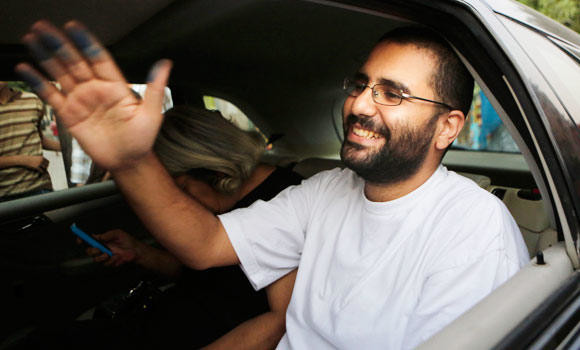CAIRO: Egypt’s most prominent activist, who is facing retrial on a 15-year prison sentence for violating a draconian protest law, was granted release on bail Monday, lawyers and relatives said.
The release of Alaa Abdel-Fattah came after dozens of activists began a hunger strike last month to protest against curbs on public demonstrations and the detention of activists, including some of the leading figures in the 2011 uprising that ended Hosni Mubarak’s nearly three-decade rule.
The lawyer representing Abdel-Fattah, a vocal government critic for more than a decade who has been repeatedly jailed, said he was released on 5,000 Egyptian pounds ($714) bail along with two other activists. Attorney Mohammed Abdel-Aziz said the three should leave prison on Tuesday once their paperwork is completed.
He added that the judge presiding over the retrial has stepped down at the request of defense lawyers. “The judge said in his reasons for stepping down that it was prompted by a show of disrespect to the court,” Abdel-Aziz said. The retrial will begin once a new judge is assigned to the case.
Last week, during the latest court session, Egyptian prosecutors presented a personal home video of Abdel-Fattah’s wife dancing as evidence against him, prompting an outcry from his lawyers that the material was irrelevant and defamatory.
The judge allowed the video to be shown at the time, but on Monday he ordered the country’s top prosecutor to investigate the use of the video, according to a judicial official. The judge called the video irrelevant to the case and said playing it in public violated the constitutional right to privacy, according to the official.
The rest of the evidence presented during the session consisted of video clips from private TV stations showing various protests and police chasing unidentified civilians. No scenes or footage of Abdel-Fattah or any other defendant in the case were shown.
Egyptian dailies linked the surprise release to an emotional letter written by Abdel-Fattah that was widely circulated by activist groups.
In his letter, Abdel-Fattah asked to be released and demanded the judge step down, saying he did not believe he would be given a fair trial.
“I have lost all confidence,” he wrote. “I am fearful over my freedom, my future, and my family. Fearful of injustice.”
“I ask you (the judge) to step aside and to give me a chance to stand before a different court, in which I would be reassured, and to start the court proceedings again without fear or enmity.”
Meanwhile, Egypt’s Interior Ministry says a roadside bomb has killed five police conscripts and an officer and injured two others near the border town of Rafah in the restive Sinai Peninsula.
A security official says the Tuesday explosion hit a special police car assigned to detect explosive devices that failed to detect the bomb because it was hidden deep underground.


Top Egyptian activist to be freed
Top Egyptian activist to be freed

Syrian government forces and Druze factions exchange prisoners in Sweida

- Damascus released 61 prisoners from the Druze factions detained in Adra Central Prison
- Druze’s National Guard Forces freed 25 Syrian government personnel in return
DAMASCUS: The Syrian government and Druze factions controlling the southern city of Sweida on Thursday carried out their first prisoner exchange since deadly clashes in the predominantly Druze city last summer, according to the Syrian government’s Sweida media office.
The swap involved Damascus releasing 61 prisoners from the Druze factions detained in Adra Central Prison near the capital, in return for the Druze’s National Guard Forces freeing 25 Syrian government personnel, the media office said.
© 2026 SAUDI RESEARCH & PUBLISHING COMPANY, All Rights Reserved And subject to Terms of Use Agreement.











